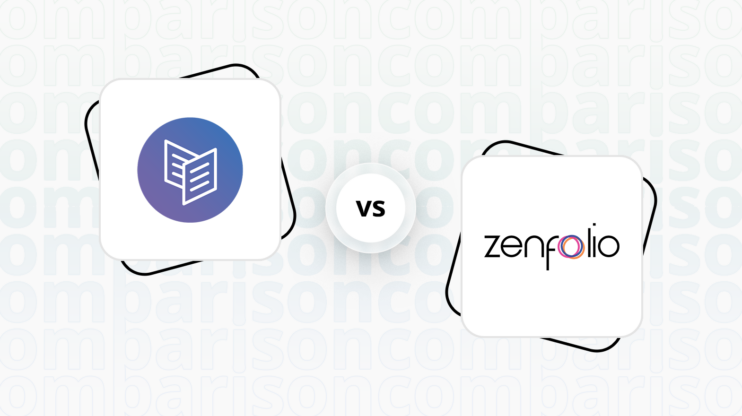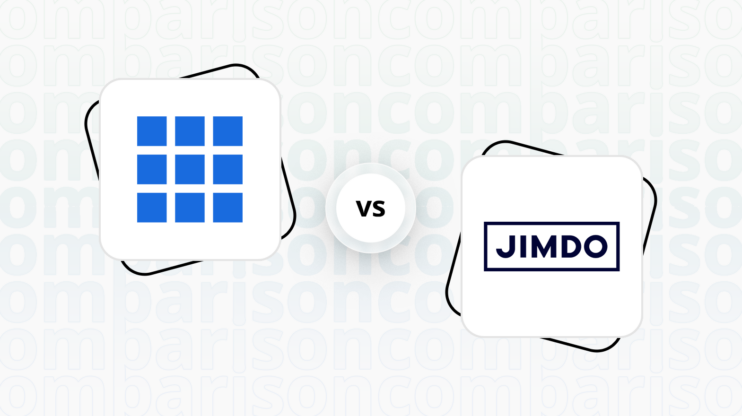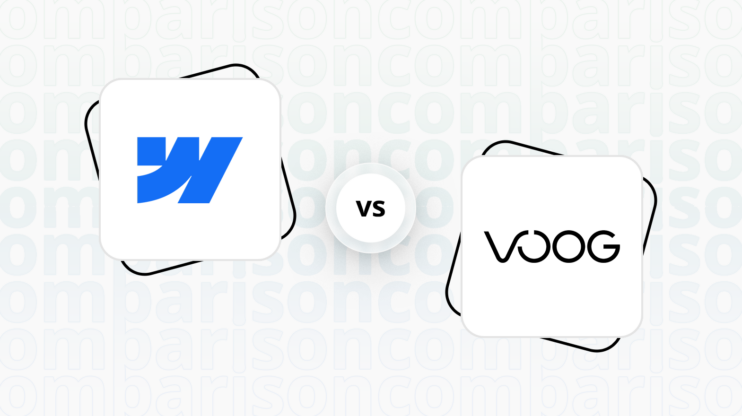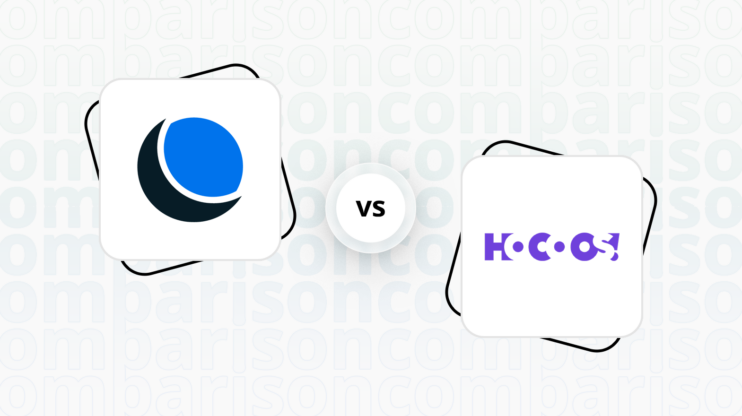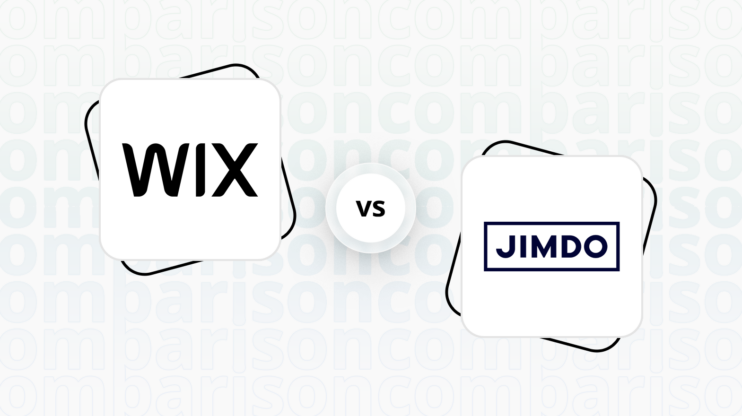Final verdict
BlueHost and Voog both offer unique strengths, making them suitable for different types of users and needs.
-
BlueHost (Overall Grade: 6.8/10)
is a comprehensive web hosting service that also includes a user-friendly website builder. It integrates seamlessly with WordPress, providing access to thousands of themes and plugins. BlueHost excels in hosting quality, security, and marketing features, making it a versatile option for a broad audience, from personal blogs to large online businesses. However, it falls short in ecommerce capabilities and product testing options compared to Voog. -
Voog (Overall Grade: 6.7/10)
is a versatile website builder focused on simplicity and design. It offers strong multilingual support, making it ideal for international businesses and personal sites aiming for a global audience. Voog stands out in design functionalities, website editors, and user management. However, it lacks the extensive plugin ecosystem and advanced security features that BlueHost offers.

|

|
|
|---|---|---|
|
Design functionalities & templates |
7.2 |
7.4 |
|
Ease of use |
8.2 |
8.1 |
|
Ecommerce |
6.8 |
6.9 |
|
Website Editors |
7.3 |
7.6 |
|
Product testing options |
6.2 |
8.6 |
|
Price |
7.2 |
7.5 |
|
Hosting quality |
8.0 |
7.7 |
|
Website speed optimization |
6.5 |
6.2 |
|
Plugins and integrations |
9.1 |
6.7 |
|
Marketing features |
7.3 |
6.9 |
|
Customer support |
7.6 |
6.1 |
|
Security |
8.3 |
7.7 |
|
AI capabilities |
1.5 |
0 |
|
User Management |
4.4 |
7.3 |
Best for ecommerce
 6.8
6.8
 6.9
6.9
Verdict
: BlueHost and Voog both offer solid ecommerce features, but their strengths cater to different needs. BlueHost is better for those who want seamless WordPress integration and a variety of hosting plans, while Voog excels in multilingual support and ease of use.
-
BlueHost
: BlueHost provides a comprehensive suite of ecommerce tools, including product listings, secure payment gateways, and inventory management. Its integration with WooCommerce allows for extensive customization and flexibility, making it a versatile choice for various business sizes. However, its POS capabilities are limited. -
Voog
: Voog stands out with its intuitive interface and strong multilingual support, making it ideal for international businesses. It offers essential ecommerce features like order management and global shipping, but may not be as robust as BlueHost in terms of product customization and additional ecommerce functionalities.
Best for informational & business websites
 7.5
7.5
 7.5
7.5
Verdict
: BlueHost and Voog both score 7.5, making them equally suitable for informational and business websites. However, their strengths cater to different user needs.
-
BlueHost
: BlueHost is a comprehensive web hosting service that also offers a user-friendly website builder. It integrates seamlessly with WordPress, providing access to thousands of themes and plugins. This makes it a versatile option for users looking to create professional-looking websites with a wide range of customization options. Its drag-and-drop interface is accessible for users with little to no coding experience, and it offers various hosting plans to cater to different needs. BlueHost is ideal for users who want a robust platform with extensive plugins and integrations. -
Voog
: Voog is a versatile website builder designed for simplicity and design. It offers an intuitive drag-and-drop interface, making it easy for both beginners and experienced web developers to create professional-looking websites without needing to write code. Voog stands out for its multilingual support, allowing users to easily create and manage websites in multiple languages. This makes it an ideal choice for international businesses and personal sites aiming for a global audience. Voog is perfect for users who prioritize ease of use and multilingual capabilities.
Detailed comparison
Design functionalities & templates
Design FunctionalitiesRepresents how well each platform allows for creative design and customization of websites.Score Components:
- Template Variety (30%): Range and quality of design templates.
- Customization (30%): Flexibility and options for design alterations.
- User Interface (20%): Ease and intuitiveness of the design process.
- Responsiveness (10%): Adaptability to different devices and screen sizes.
- Innovation (10%): Unique design features and tools.
 7.2
7.2
 7.4
7.4
🏆
Winner: Voog.
Although both platforms offer a range of design functionalities and templates, Voog edges out BlueHost with a slightly higher score.
BlueHost’s WordPress website builder offers over 300 pre-installed templates and designs to cater to the diverse needs of its users, ensuring that there’s something for everyone, regardless of the niche or industry. These templates are designed to be responsive and SEO-friendly, enhancing the user experience and visibility of the websites.
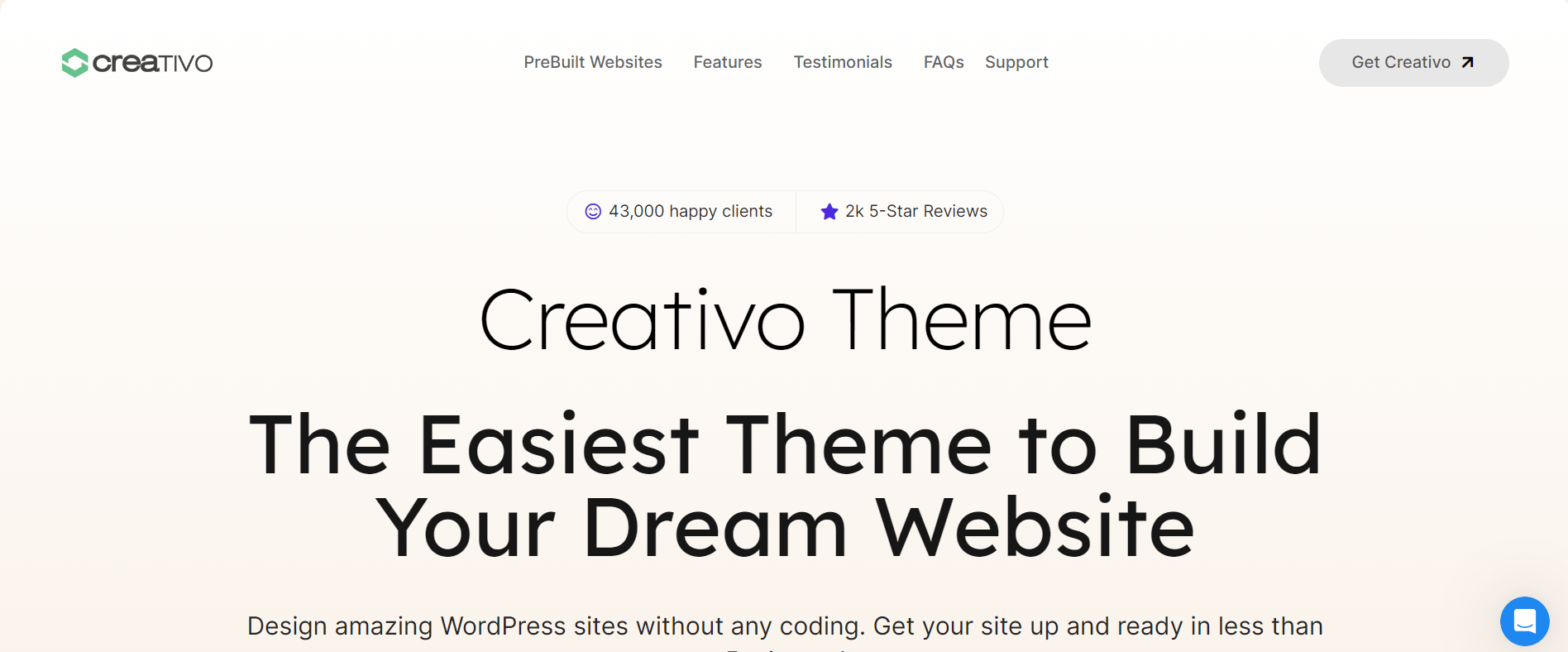
On the other hand, Voog offers a diverse range of design templates across various categories tailored for different website types such as business services, online stores, blogs, and more, catering to a wide audience. The platform highlights specific templates for creating visually appealing and functional webstores and blogs, emphasizing user-friendly design and mobile responsiveness.

Get a head start on website creation with AI
Create a custom website tailored to your business needs 10X faster with 10Web AI Website Builder!
Ease of use
Ease of useReflects the platform’s overall user-friendliness.Score
Components:
- Learning curve (40%): Quickness and ease of getting started.
- Interface design (30%): Simplicity and intuitiveness of layout.
- User guidance (20%): Quality of tutorials and support.
- Flexibility (10%): Adaptability to various user skills.
 8.2
8.2
 8.1
8.1
🏆 Winner: BlueHost
. With a score of 8.2, BlueHost edges out Voog, which scored 8.1. BlueHost’s website builder is designed with simplicity in mind, making it highly accessible for users of all skill levels. Voog, while also user-friendly, may lack the advanced customization options found in more complex platforms.
Learning Resources
🏆 Winner: BlueHost
. Both platforms offer solid learning resources, but BlueHost’s WordPress Academy offers a wide range of free, comprehensive learning resources developed by WordPress experts, aimed at users of all levels. Voog, on the other hand, provides extensive learning resources tailored to a broad audience, but does not offer the same level of expert-led instruction.
For ecommerce
EcommerceMeasures the platform’s effectiveness in supporting online business activities.Score Components:
- Ecommerce themes and templates (20%): Variety and design of templates.
- Product management (25%): Ease of managing and organizing products.
- Payment options (25%): Variety and convenience of payment methods.
- Ecommerce features (20%): Features for managing an ecommerce store.
- Integration (10%): Compatibility with external e-commerce tools and services.
 6.8
6.8
 6.9
6.9
When it comes to ecommerce, both BlueHost and Voog offer a range of features designed to help users build and manage online stores. However, their offerings differ in several ways, which could make one platform more suitable than the other depending on the specific needs of the user.

|

|
|
|---|---|---|
|
Ecommerce themes and templates |
6.5 |
6.5 |
|
Product page customization |
7.0 |
6.8 |
|
Payment processing and commissions |
6.8 |
7.0 |
|
POS capabilities |
0.0 |
5.0 |
|
Payment gateways |
7.5 |
7.5 |
|
Product numbers |
6.0 |
5.5 |
|
Additional ecommerce features |
6.5 |
6.0 |
BlueHost ecommerce features:
- Product Listings
- Shopping Carts
- Secure Payment gateways
- Shipping Options and Tax Calculations
- Inventory Management
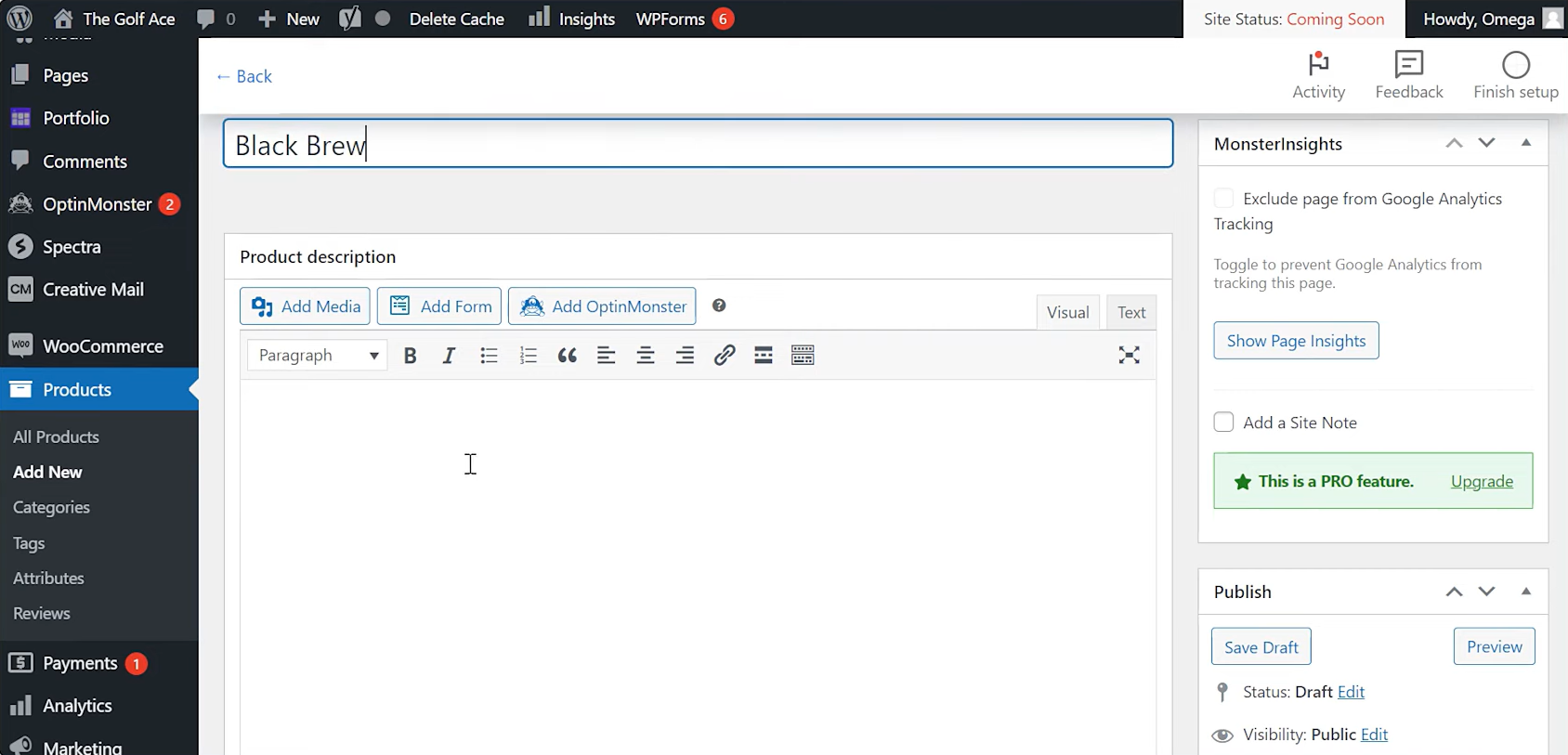
Voog ecommerce features:
- Order management
- Global shipping
- Product variants
- Payment gateways integration
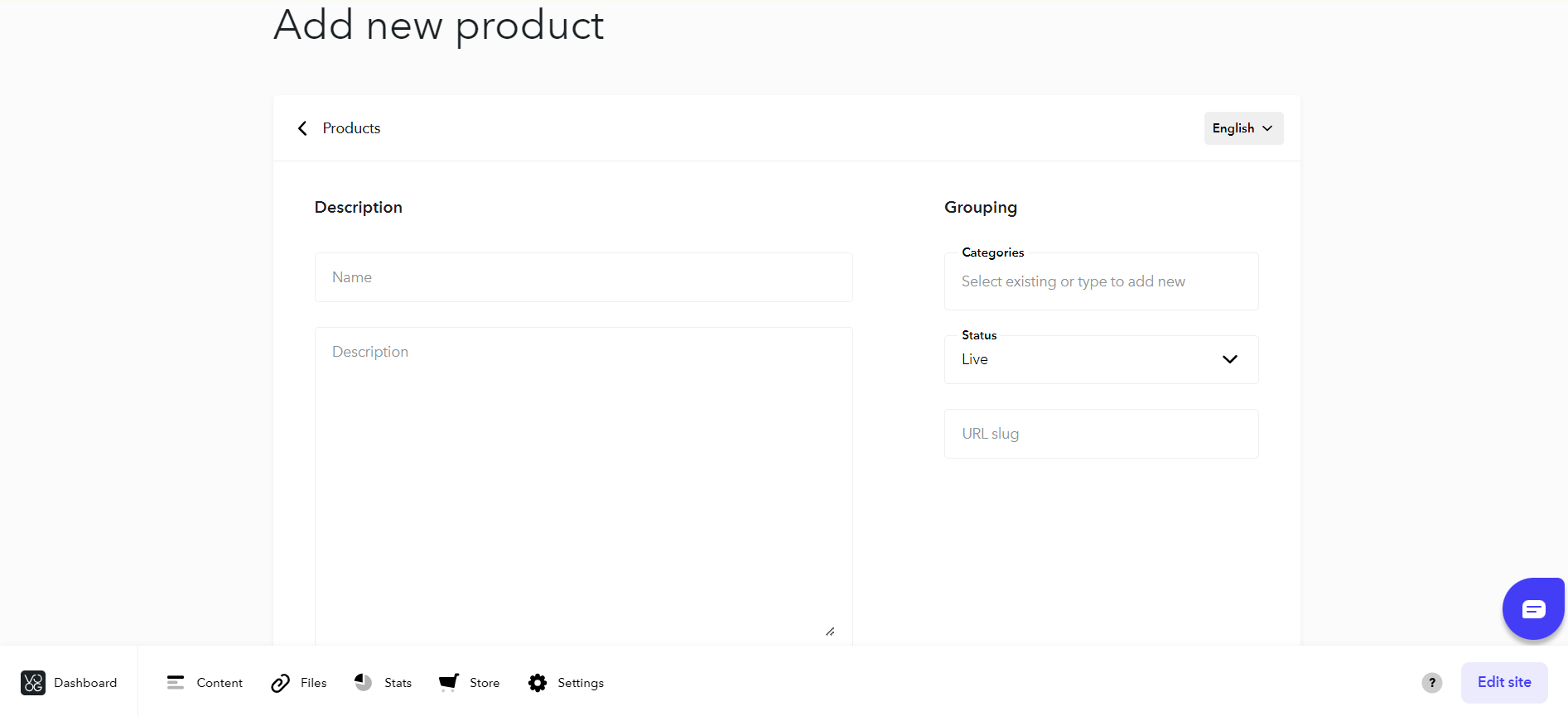
Ecommerce themes & templates
BlueHost’s website builder for eCommerce provides a selection of specific templates designed to streamline the creation of online stores. These templates are optimized for sales, featuring designs that accommodate product galleries, shopping carts, and checkout processes. On the other hand, Voog highlights around 18 templates optimized for building online stores. These templates are praised for their attractive landing pages, spacious backgrounds for product images, and structured product and product list layouts.
Product page customization
BlueHost’s website builder offers robust customization features for product pages, allowing users to tailor product details like titles, descriptions, images, and pricing according to their preferences. It supports the creation of product variants and options, facilitating the sale of items with multiple choices such as size, color, and material directly from the product page. Voog website builder provides functionality for customization of product pages within an online store. It enables the modification of various product aspects such as names, descriptions, categories, visibility status, and URL slugs. The system also allows for the inclusion of multiple images per product, and offers settings for net and sale prices, VAT rates, and inventory tracking.
Payment processing
BlueHost doesn’t directly support numerous payment gateways. However, it does integrate with WooCommerce, a platform that facilitates integration with various payment gateways like PayPal and Stripe. Voog supports a variety of payment gateways to accommodate diverse online transaction needs. Supported gateways include Swedbank Payment Gateway, Bank links through MakeCommerce (Nordics and Baltics), Montonio, Stripe, PayPal, EveryPay (for card payments and payment initiation), and Luminor Payment Gateway. These options offer flexibility in payment methods, catering to users in different regions and with different banking preferences. Voog also details its transaction fees, including a 3% fee for standard sales, while premium plan subscribers enjoy the benefit of no transaction fees.
Website Editors
Website EditorsEvaluates the platforms’ website building and editing capabilities.Score Components:
- Customization tools (40%): Range and power of editing features.
- Editor usability (30%): User experience within the editor.
- Design flexibility (20%): Freedom in layout and design changes.
- Update and maintenance ease (10%): Simplicity of updating and maintaining the site.
 7.3
7.3
 7.6
7.6
🏆
Winner: Voog
. Voog, with a score of 7.6, offers a powerful and user-friendly website builder editor. It caters to a wide range of needs from basic blogs to complex, multilingual websites. It offers a rich array of features including customizable templates, SEO tools, e-commerce functionalities, and developer-friendly tools for advanced customization. With its strong multilingual support, Voog stands out as an ideal choice for creating international websites, ensuring accessibility for a global audience.
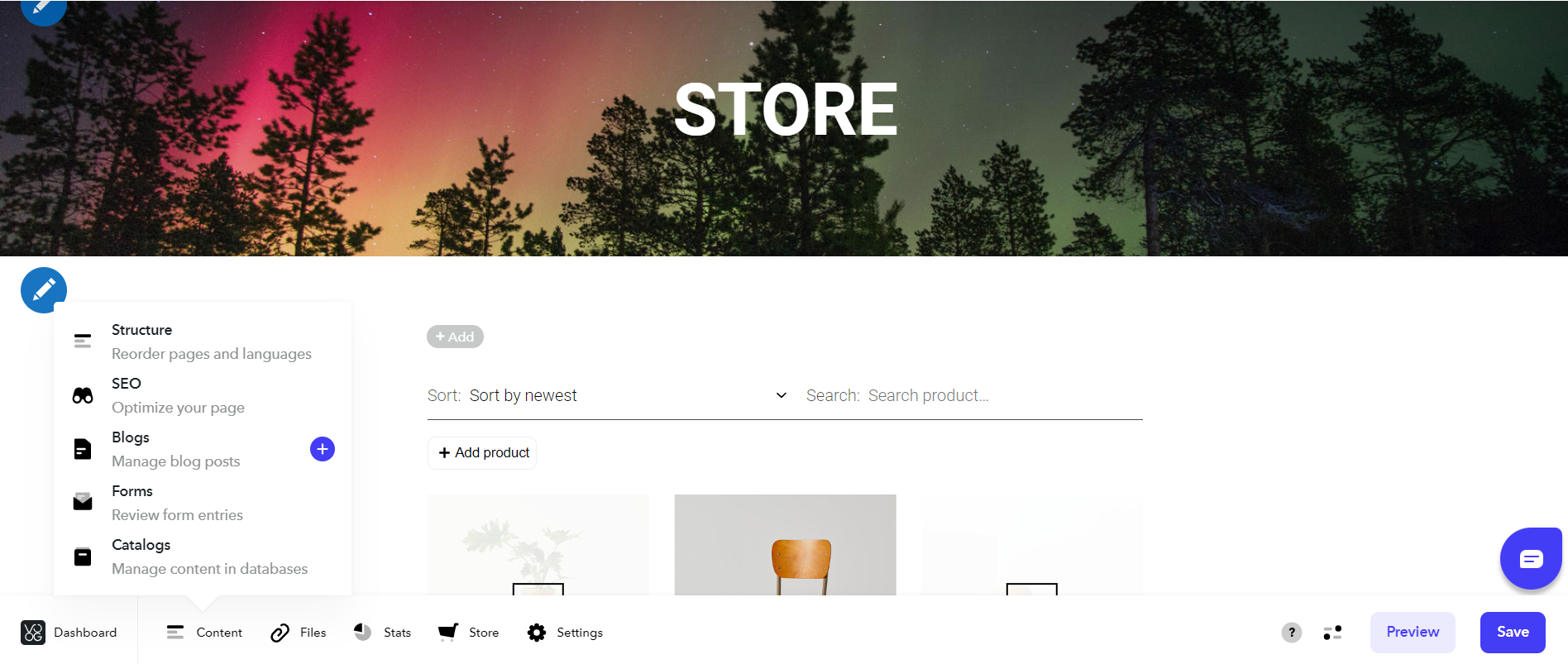
BlueHost’s website builder editor, scoring 7.3, is designed for ease of use, catering to both beginners and advanced users. It offers a section based drag-and-drop interface, allowing users to easily add, remove, and customize elements on their website without needing to code. Users can choose from a wide range of templates and customize them to fit their brand, including adjusting layouts, colors, and fonts. Additionally, the editor provides access to stock photos, SEO tools, and responsive design features, ensuring websites look great on all devices and can rank well on search engines.
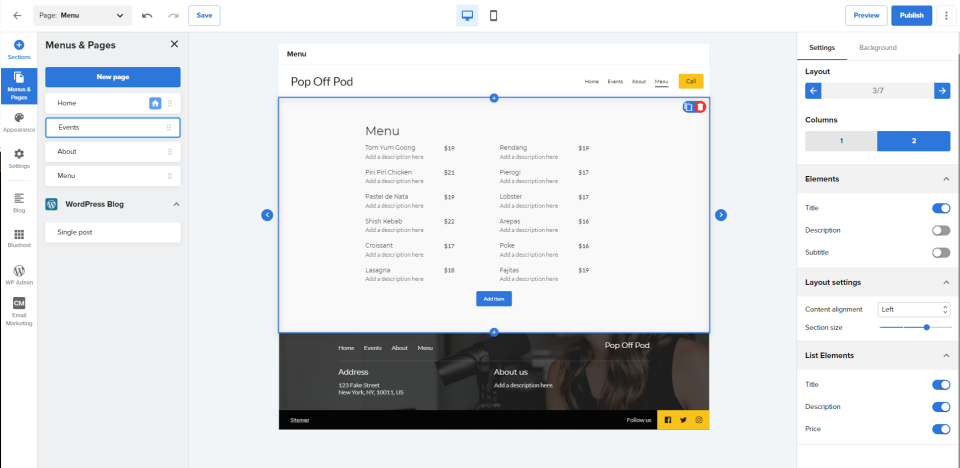
Mobile editor/app
 5.0
5.0
 5.5
5.5
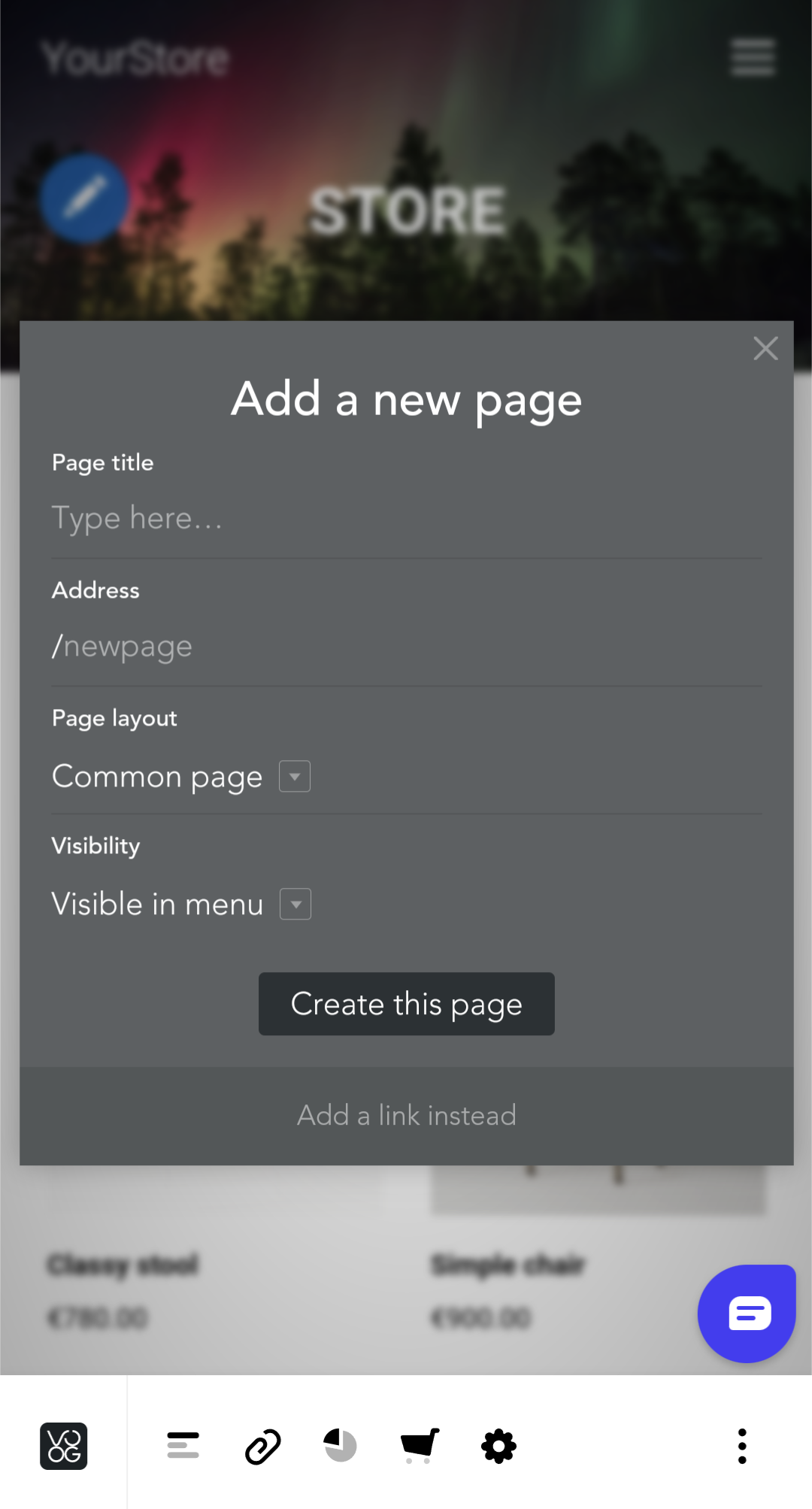
🏆
Winner: Voog
. Both BlueHost and Voog do not have a dedicated mobile editor app, but they allow users to manage and edit their websites using the mobile browser version of the editor. However, Voog has a slightly higher mobile editor score (5.5) than BlueHost (5.0), indicating that it provides a better mobile editing experience.
BlueHost’s mobile editing capabilities are somewhat limited, and while it’s possible to make changes to your website on a mobile device, the experience may not be as smooth or intuitive as on a desktop.
On the other hand, Voog’s mobile browser version of the editor allows users to manage and edit their websites on the go, providing a more flexible and convenient solution for those who need to make quick changes or updates to their site from anywhere.
Product testing options
Product Testing OptionsAssesses the options for trying out platform features before commitment.Score Components:
- Trial quality (40%): Extent and usefulness of the trial or free version.
- Feature accessibility (30%): How many features are available to test.
- Trial duration (20%): Length of the trial period.
- Ease of transition (10%): Smoothness of moving from trial to paid plans.
 6.2
6.2
 8.6
8.6
Overall Result
:
Voog Wins
. Voog scores 8.6 in product testing options, significantly higher than BlueHost’s 6.2. Voog offers a 30-day free trial, during which users can test all premium features. BlueHost, on the other hand, does not offer a free trial, but users can test premium features within a 30-day refundable period.

|

|
|
|---|---|---|
|
Free Plan |
No | No |
|
Trial Duration |
No |
30 days |
|
Testing Premium Features |
Within 30-day refundable period |
During free trial |
|
Money Back Guarantee |
30-day money back guarantee |
No |
Price
PriceLooks at the cost-effectiveness and value for money of each platform.Score Components:
- Plan value (40%): What each pricing tier offers.
- Transparency and clarity (30%): Clearness of pricing structures.
- Flexibility of plans (20%): Range of options to suit different budgets.
- Hidden costs (10%): Additional expenses not included in the plan.
 7.2
7.2
 7.5
7.5
BlueHost and Voog both offer competitive pricing, but BlueHost’s plans are more comprehensive, while Voog’s are simpler and more straightforward.

|

|
|
|---|---|---|
|
$10-$20 |
Basic ($15.99/month): Made for a simple website or blog, 1 website with 10GB SSD storage, Free CDN, Free Domain 1st year, Managed WordPress Hosting, Free SSL 1st year and Chat Support. Value for price: 6.5 |
Standard (€14/month): Good for simple websites, with unlimited bandwidth, up to 30 website pages, online store with up to 3 products, 3% transaction fees, 5GB file storage, and up to 3 contributors. Value for price: 6.5 |
|
$20-$30 |
Choice Plus ($27.99/month): Ideal for multiple sites needing storage, security, backups, 3 websites with 40GB SSD storage, Free CDN, Free Domain 1st year, Managed WordPress hosting, Free SSL, Free Domain privacy 1st year, Malware scanning, daily site backups are free for the 1st year with the purchase of a 12 or 36-month package. Otherwise, users are required to pay a one-time fee of $35.88 for backup services. Value for price: 7.5 |
Plus (€22/month): Recommended for most users for more advanced websites, with free custom domain if annual subscription is purchased, unlimited bandwidth, unlimited website pages, online store with unlimited products, 3% transaction fees, 20GB file storage, and unlimited contributors. Value for price: 8.0 |
|
$30-$35 |
Online Store ($32.99/month): Great for all online selling, built-in eCommerce tools, 3 websites with 40GB SSD storage, Free CDN, Free Domain 1st year, Managed WordPress hosting, Free Domain privacy 1st year, Malware Scanning, Exclusive Theme Store, Store Analytics, Unlimited products, Secure Payment options, Bookings & appointments, Shipping labels, product search and filtering, daily site backups are free for the 1st year with the purchase of a 12 or 36-month package. Otherwise, users are required to pay a one-time fee of $35.88 for backup services. Value for price: 8.5 |
No offering at this amount. |
|
$35+ |
Pro ($39.95/month): Perfect for high traffic, advanced storage, security, 5 websites with 100GB SSD storage, Free CDN, Free Domain 1st year, Managed WordPress hosting, Free SSL, Free Domain privacy 1st year, Malware Scanning, daily site backups are free for the 1st year with the purchase of a 12 or 36-month package. Otherwise, users are required to pay a one-time fee of $35.88 for backup services. Value for price: 9.0 |
Premium (€50/month): Designed for more advanced needs with free custom domain if annual subscription is purchased, unlimited bandwidth, unlimited website pages, online store with unlimited products, no transaction fees, unlimited file storage, and contributors. Value for Price: 9.0 |
location. As a result in rare cases the prices displayed here can differ from the ones you see on their
websites.
Hosting quality
Hosting
qualityExamines the reliability and performance of the hosting solutions.Score Components:
- Uptime (40%): Consistency and reliability of website availability.
- Speed (30%): Loading times and performance.
- Bandwidth and storage (20%): Sufficiency of resources provided.
- Data centers (10%): Quality and distribution of hosting infrastructure.
 8.0
8.0
 7.7
7.7
Winner: BlueHost
. BlueHost offers a range of hosting options with features designed to support websites at various stages of growth, from shared to dedicated hosting. Their hosting plans include technologies to ensure fast load times, such as SSD storage, CDN services, and Cloudflare integration. On the other hand, Voog offers hosting with unlimited bandwidth, from 5GB to unlimited storage and automated daily backups. However, Voog does not disclose the type of hosting it offers or the locations of its data centers, which gives BlueHost an edge in this comparison.

|

|
|
|---|---|---|
|
Do they offer hosting? |
Yes, offers a range of hosting options with features designed to support websites at various stages of growth, from shared to dedicated hosting. | Yes, with unlimited bandwidth, from 5GB to unlimited storage and automated daily backups. |
|
Data Centers: |
6 data centers: Orem and Provo, Shanghai, Mumbai and Hong Kong, London | Voog does not disclose the locations of its data centers |
|
Type of hosting: |
Managed WordPress Hosting | Voog does not mention what kind of hosting types does the platform offer. |
|
Uptime: |
99.9% | 99.9% |
|
Uptime Guarantee: |
Yes, 99.9% | Yes, 99.9% |
Website Speed Optimization
Website Speed OptimizationEvaluates optimization of website loading timesScore Components:
- PageSpeed Score (30%): Google’s score indicating performance optimization.
- Loading Time (30%): The average time until a website is fully interactive.
- Mobile Optimization (15%): Optimization effectiveness for mobile devices.
- Resource Optimization (15%): Optimizing images, scripts, and other heavy resources.
- CDN Usage (10%): Use of CDN to enhance speed across geolocations.
 6.5
6.5
 6.2
6.2
🏆 Winner: BlueHost
Both BlueHost and Voog prioritize website performance and page speed, but BlueHost edges out Voog with a slightly higher website speed optimization score.

|

|
|
|---|---|---|
|
Focus |
CDN, Server Optimization |
Mobile Responsive design, Caching, Image Optimization, Code minification |
|
Performance Tools |
Google Lighthouse, PageSpeed Insights |
Google PageSpeed Insights |
|
Key Strategies |
CDN, Server Optimization |
Mobile Responsive design, Caching, Image Optimization, Code minification |
|
Load Times |
Varies widely, depending on the optimization, website complexity |
Varies depending on optimization and website complexity |
|
Page Speed Scores Range |
Varies widely, depending on the optimization, website complexity |
Varies depending on optimization and website complexity |
|
Core Web Vitals Improvement |
Emphasis on LCP, FID, CLS improvements |
No disclosed information |
BlueHost, a comprehensive web hosting service that also offers a user-friendly website builder, focuses on CDN and server optimization to enhance website speed. It integrates seamlessly with WordPress, allowing for a wide range of customization options and access to thousands of themes and plugins. BlueHost provides a variety of hosting plans that cater to different needs, from personal blogs to large online businesses, making it a versatile option for a broad audience. It places emphasis on improving Core Web Vitals, specifically LCP, FID, and CLS.
Voog, on the other hand, is a versatile website builder designed for creating and managing websites with a strong focus on simplicity and design. It offers users an intuitive drag-and-drop interface, making it easy for both beginners and experienced web developers to create professional-looking websites without needing to write code. Voog stands out for its multilingual support, allowing users to easily create and manage websites in multiple languages. It employs strategies such as mobile responsive design, caching, image optimization, and code minification for speed optimization. However, Voog does not disclose any information on their Core Web Vitals improvements.
Get a head start on website creation with AI
Create a custom website tailored to your business needs 10X faster with 10Web AI Website Builder!
Plugins and integrations
Plugins and integrationsMeasures the range and effectiveness of additional plugins and integrations.Score Components:
- Variety of options (40%): Range of available add-ons.
- Integration smoothness (30%): Ease of integrating plugins into the site.
- Quality of plugins (20%): Functionality and reliability of the options.
- Custom integration capabilities (10%): Support for custom or third-party integrations.
 9.1
9.1
 6.7
6.7
🏆 Winner: BlueHost.
With a score of 9.1, BlueHost takes the lead in this category. Its integration with WordPress opens up a vast ecosystem of plugins and extensions, ranging from SEO tools to e-commerce solutions. Voog, scoring 6.7, also offers a wide range of integrations, but it doesn’t match the extensive options provided by BlueHost.
However, Voog’s integrations are well-categorized and cover a wide range of needs, making it a versatile tool for online presence management.
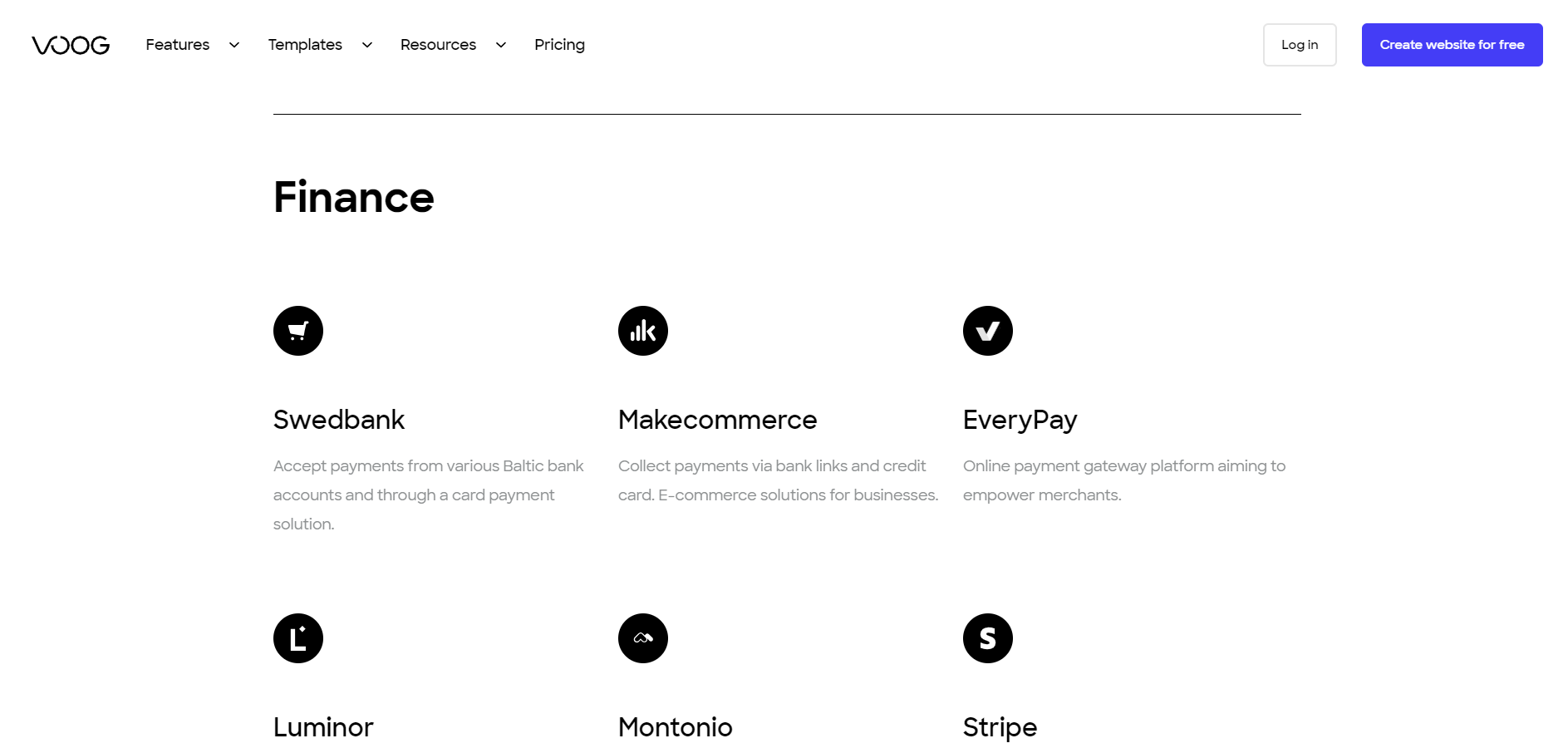
Marketing Features
Design FunctionalitiesRepresents how well each platform allows for creative design and customization of websites.Score Components:
- Template Variety (30%): Range and quality of design templates.
- Customization (30%): Flexibility and options for design alterations.
- User Interface (20%): Ease and intuitiveness of the design process.
- Responsiveness (10%): Adaptability to different devices and screen sizes.
- Innovation (10%): Unique design features and tools.
 7.3
7.3
 6.9
6.9
🏆
Overall Winner: BlueHost
. BlueHost edges out Voog with a slightly higher score, offering a comprehensive suite of marketing tools, especially with its seamless integration with WordPress. Voog, however, stands out with its multilingual support and easy integration with third-party services.

|

|
|
|---|---|---|
|
SEO Tools |
Yes, both built in and third party WordPress plugins integrations |
Yes, including the ability to customize META descriptions |
|
Email Marketing |
Yes, with using the Creative Mail plugin |
Yes, through integration of third-party services such as Mailchimp |
|
Blogging |
Yes, using WordPress blogging tools |
Yes |
|
Social Media Integration |
Yes |
Yes |
|
Analytics and Reporting |
Yes, integration of Google Analytics and other WordPress plugins |
Yes, basic built-in analytics tools, and integration of Google Analytics |
|
Ads and Promotions |
Yes |
Yes, through integration of third-party services |
Customer Support
Customer supportEvaluates the quality and availability of support options.Score Components:
- Response time (40%): Speed of support responses.
- Support quality (30%): Effectiveness and helpfulness of the support.
- Availability (20%): Range of support channels (phone, chat, email).
- Resource richness (10%): Quality of self-help and educational materials.
 7.6
7.6
 6.1
6.1
🏆 Winner: BlueHost
. Comparing BlueHost vs Voog, BlueHost takes the lead in this category with its 24/7 customer support availability through chat and phone. BlueHost’s commitment to providing round-the-clock assistance ensures that users can get help whenever they need it, which is crucial for maintaining a smooth website operation. Additionally, BlueHost offers technical assistance from 7 a.m. to midnight EST, seven days a week, making it a reliable option for users across different time zones.
Voog, on the other hand, offers customer support through email, available 7 days a week. While Voog provides a range of support guides to assist users, its lack of real-time support options like live chat or phone support can be a limitation for users who need immediate assistance. Despite this, Voog’s focus on simplicity and design, along with its multilingual support, makes it a valuable choice for users looking to create and manage websites in multiple languages.
Security
SecurityLooks at the platforms’ security measures and data protection.Score Components:
- Data protection (40%): Safeguards for user and customer data.
- SSL and encryption (30%): Implementation of secure connections.
- Compliance (20%): Adherence to industry security standards.
- Regular updates (10%): Frequency of security updates and patches.
 8.3
8.3
 7.7
7.7
🏆
Winner: BlueHost
. BlueHost’s security measures are comprehensive, offering SSL certificates, regular backups, and additional features like SiteLock for malware scanning. They also provide 24/7 monitoring to promptly detect and respond to security threats, ensuring a secure and reliable hosting environment for users.
Voog also prioritizes security, offering SSL encryption and managing technical aspects such as hosting, security updates, and backups on behalf of the user. However, BlueHost’s more extensive security features and higher security score give it the edge in this category.
AI Capabilities
AI capabilitiesMeasures the effectiveness of AI-driven features and tools.Score Components:
- Automation efficiency (40%): Impact of AI on streamlining processes.
- Personalization (30%): AI-driven customization for users or customers.
- AI-Assisted design (20%): Role of AI in website design and functionality.
- Data analysis (10%): Use of AI in interpreting user data and analytics.
 1.5
1.5
 0
0

|

|
|
|---|---|---|
|
Personalized Design |
|
|
|
SEO Optimization |
|
|
|
Customer Behavior Analysis |
|
|
|
Sales Predictions |
|
|
|
Inventory Management |
|
|
|
Content Generation |
Possible through WordPress plugins |
|
🏆 Winner: BlueHost
. Neither BlueHost nor Voog have built-in AI capabilities. However, BlueHost, with a score of 1.5, has the advantage of being able to integrate with WordPress, which has a variety of AI plugins available. This allows for potential AI capabilities, such as content generation, through the use of these plugins. Voog, with a score of 0, does not have any AI capabilities.
User Management
User ManagementAssesses the platforms’ capabilities in managing user roles, permissions, and accessibility.Score Components:
- Role Customization (40%): Flexibility in creating and defining user roles and
permissions. - Ease of Management (30%): User interface and tools for managing users.
- Access Control (20%): Effectiveness of access control measures for different user
levels. - Scalability (10%): Ability to manage a growing number of users efficiently.
 4.4
4.4
 7.3
7.3
🏆 Winner: Voog
. Both BlueHost and Voog support multi-user management, but Voog provides more flexibility and clarity in terms of user roles and permissions.
- BlueHost supports multi-user management, but there’s no specific information about the number of users or their roles and permissions.
- Voog allows a varying number of contributors based on the chosen plan. The Standard plan supports up to 3 contributors, while the Plus and Premium plans support unlimited contributors. This flexibility makes Voog suitable for both small teams and larger organizations.
BlueHost User Roles and Access Levels:
BlueHost does not provide specific information about user roles and access levels.
Voog User Roles and Access Levels:
| Role | Description | Access Highlights |
|---|---|---|
| Admin | Admins, also known as owners, have full control over the website. They can manage all aspects of the site without any restrictions. | Full site management, including key account settings like subscription info. |
| Editor | Editors can manage certain aspects of the site, but they do not have access to key account settings. Their role is more focused on content management. | Limited to certain site settings; cannot manage subscription or account settings. |
Additional Features

|

|
|
|---|---|---|
|
SSL Certificate |
|
|
|
Custom Domain |
|
|
|
Free Custom Domain Included |
|
|
|
International Domains |
|
|
|
Mobile Responsive |
|
|
|
Page Speed |
|
|
|
Website Builder Mobile App |
|
|
|
Convert a Website To An App |
|
|
|
Website Analytics |
|
|
|
Multilingual Sites |
|
|
|
Multiple Users |
|
|
User Feedback
Users appreciate BlueHost for its comprehensive free offerings, including SSL, subdomains, and custom email, along with additional services like free domain registration and CDN. The platform’s intuitive interface and user-friendly website builder cater to both beginners and experienced developers. However, concerns arise regarding the significant price increase upon renewal, limited free website templates, and unresolved technical issues with poor customer support, hindering users’ ability to effectively manage their websites and businesses. Addressing these concerns could enhance overall user satisfaction with BlueHost.
The feedback for Voog emphasizes the platform’s ease of use, allowing users to create their workspace seamlessly. The main critique focuses on the desire for a more diverse and larger selection of stock photos. Voog is commended for its ability to facilitate the development of better products for client navigation, highlighting its problem-solving capabilities and benefits to the user and their team. This makes Voog a strong contender in the BlueHost vs Voog comparison.
The making of this blog
We followed a clear, step-by-step process to write and research this article.
FAQ
Which platform is better for beginners, BlueHost or Voog?
Can I use both BlueHost and Voog for creating a multilingual website?
How do BlueHost and Voog compare in terms of ecommerce features?
Which platform offers better customer support, BlueHost or Voog?
Are there any significant differences in the pricing plans of BlueHost and Voog?
Which platform is better for website speed optimization?
Can I manage multiple users on both BlueHost and Voog?
Which platform has better security features?
Do BlueHost and Voog offer AI capabilities?
What are the main advantages of using Voog over BlueHost?










